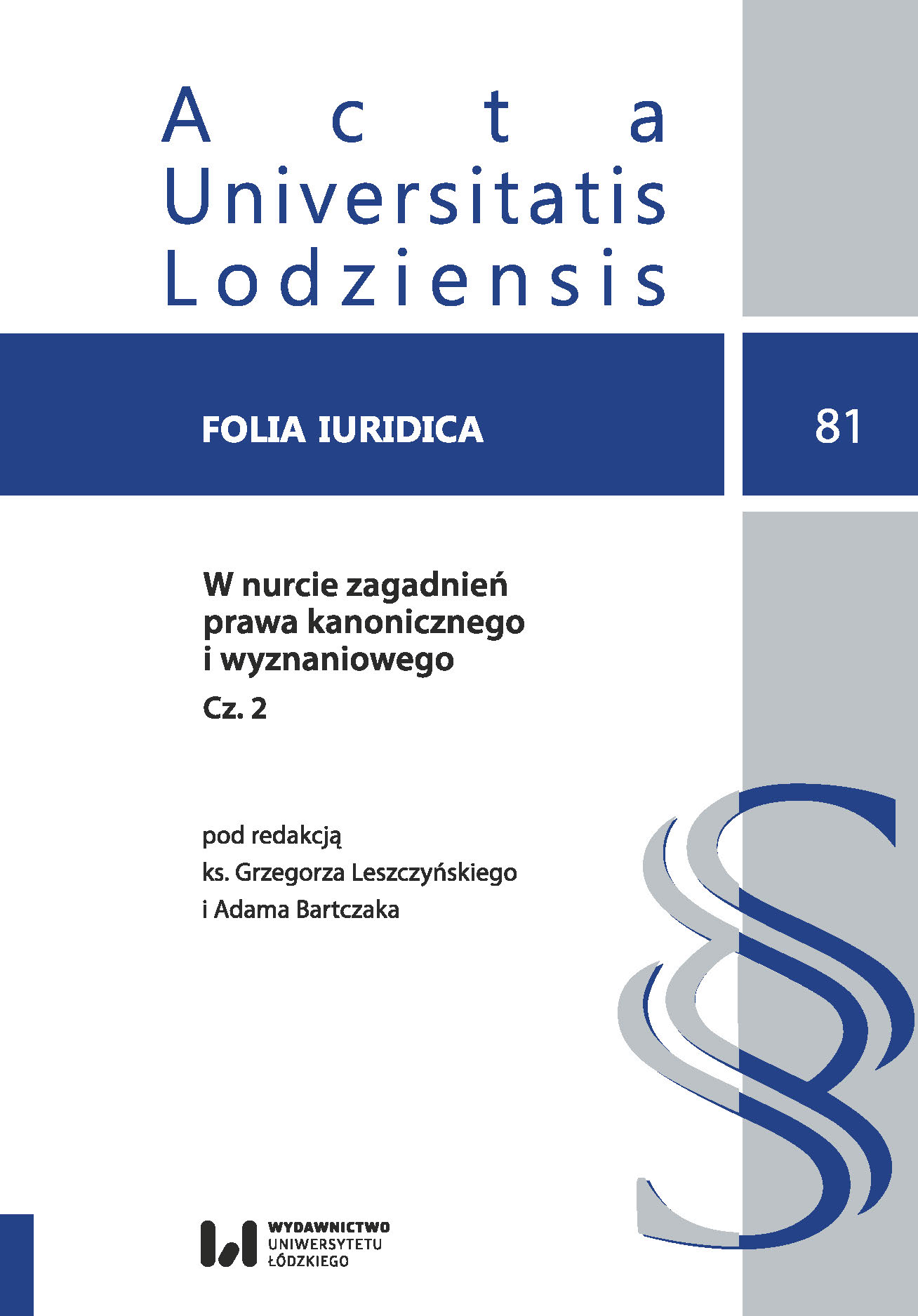The good of spouses as object of simulation of the marriage consent
DOI:
https://doi.org/10.18778/0208-6069.81.03Keywords:
marriage, matrimonial consent, simulation, good of spouses, exclusionAbstract
The Code of Canon Law of 1983 classifies the reasons for marriage invalidity in three different categories: diriment impediments, defects in matrimonial consent and a lack or a defect of the canon form. In 1101 § 2 the Code of Canon Law enumerates different forms of simulations among different defects in matrimonial consent. Simulation signifies that a person contracting marriage expresses a marital agreement merely on the surface, excluding in reality through a positive act of the will the marriage itself or its essential element or an essential quality of the marriage. The present article is an attempt to look at the relation existing between the validity of marriage and the exclusion of the good of spouses, with the consideration of the object of the simulation form and the ways of delivering proof of it.
Downloads
References
Codex Iuris Canonici auctoritate Ioannis Pauli PP. II promulgatus. 1984. Przekł. polski zatwierdzony przez Konferencję Episkopatu. Poznań: Pallottinum.
Google Scholar
Pontificia Commisio Iuris Canonici Reconoscendo. 1977. Communicationes 9: 123.
Google Scholar
Pontificia Commisio Iuris Canonici Reconoscendo. 1983. Communicationes 15: 221.
Google Scholar
Sent. coram Fagiolo (30 października 1970). 1970. Sacrae Romanae Rotae Decisiones seu Sententiae 62: 878–990.
Google Scholar
Sent. coram Pinto (23 listopada 1979). 1980. Monitor Ecclesiasticus 105: 393.
Google Scholar
Sobór Watykański II. 2002a. „Konstytucja dogmatyczna o Kościele Lumen gentium”. W Sobór Watykański II. Konstytucje, dekrety, deklaracje. 104–166. Poznań: Pallottinum.
Google Scholar
Sobór Watykański II. 2002b. „Konstytucja duszpasterska o Kościele w świecie współczesnym Gaudium et spes”. W Sobór Watykański II. Konstytucje, dekrety, deklaracje. 526–606. Poznań: Pallottinum.
Google Scholar
Arroba Conde, Manuel. 1993. Diritto processuale canonico. Roma: Ediurcla.
Google Scholar
Bertolino, Rinaldo. 1996. „Gli elementi costitutivi del bonum coniugum: stato della questione”. W Il bonum coniugum nel matrimonio canonico. 7–32. Città del Vaticano: Libreria Editrice Vaticana.
Google Scholar
Bonnet, Pier Antonio. 1996. „Il bonum coniugum e l’essenza del matrimonio”. W Il bonum coniugum nel matrimonio canonico. 89–135. Città del Vaticano: Libreria Editrice Vaticana.
Google Scholar
Gajda, Piotr Mieczysław. 2000. Prawo małżeńskie Kościoła katolickiego. Tarnów: Wydawnictwo Biblos.
Google Scholar
García Failde, Juan Jose. 1984. Nuevo derecho procesal canónico. Salamanca: Universidad Pontificia de Salamanca.
Google Scholar
Góralski, Wojciech. 2000. Kanoniczne prawo małżeńskie. Warszawa: Polskie Wydawnictwo Prawnicze Iuris.
Google Scholar
Leszczyński, Grzegorz. 2000. „Oświadczenia stron jako środek dowodowy w procesie o stwierdzenie nieważności małżeństwa”. Prawo Kanoniczne 43 (1–2): 107–121.
Google Scholar
Leszczyński, Grzegorz. 2002. „Niedojrzałość emocjonalna a wykluczenie dobra małżonków”. Ius Matrimoniale 7 (13): 87–110.
Google Scholar
Viladrich, Pedro Juan, 2002. Konsens małżeński. Sposoby prawnej oceny i interpretacji w kanonicznych procesach o stwierdzenie nieważności małżeństwa. Warszawa: Wydawnictwo Uniwersytetu Kardynała Stefana Wyszyńskiego.
Google Scholar














